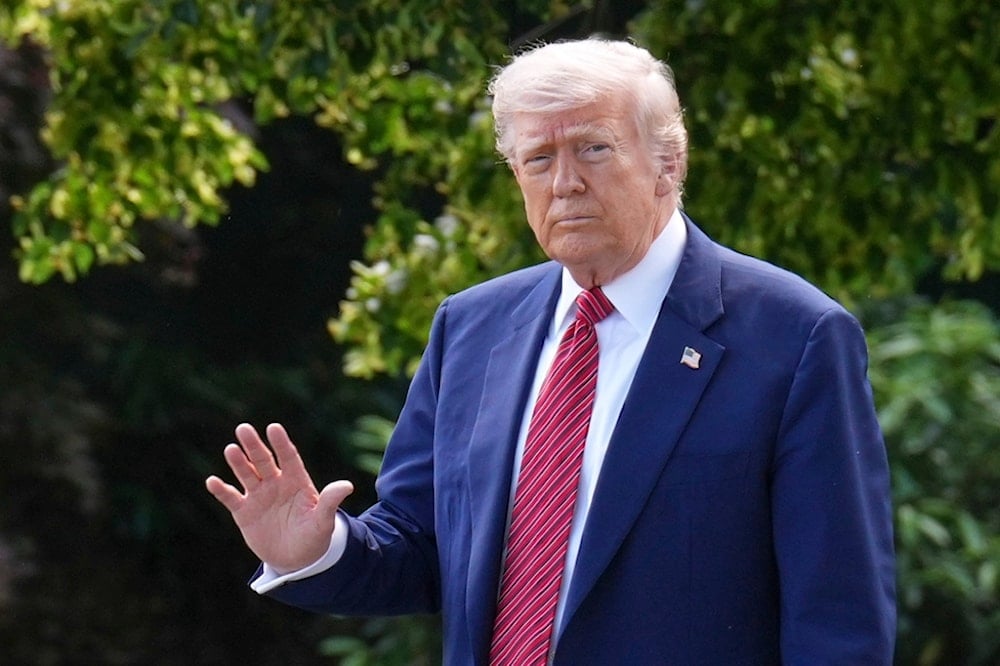Trump to Netanyahu: No green light to attack Iran, pursue deal
The firm statement came in response to Netanyahu's demand that Trump abandon ongoing negotiations with Tehran and support an Israeli military operation.
-

President Donald Trump waves as he departs the White House, Friday, May 23, 2025, in Washington. (AP Photo/Jacquelyn Martin)
US President Donald Trump has reportedly told Israeli Prime Minister Benjamin Netanyahu that "Israel" does not have a "green light" to launch a military strike against Iran, emphasizing that diplomacy remains Washington's preferred path.
According to Israeli Channel 12 sources, Trump stated during a phone conversation on Monday, "You don't have a green light, there will be a deal with Iran. The attack (on Iran) needs to be taken off the agenda right now."
The firm statement came in response to Netanyahu's demand that Trump abandon ongoing negotiations with Tehran and support an Israeli military operation. Netanyahu reportedly insisted that Washington should "cease talks and support direct military action."
Despite Netanyahu's warning that "negotiations with Iran are futile, and they are trying to deceive you; all they want is to buy time," Trump pushed back, reiterating that "nothing closes the door" and that "work is underway to reach an agreement." Israeli Channel 12 previously reported that Trump expected a "not-so-good response" from Iran but remains committed to diplomacy.
Trump also addressed the war in Gaza during the call, urging Netanyahu to de-escalate. "I want you to work on ending the war in Gaza, not just the Deal of the Century, the war has exhausted itself," he said.
Intelligence blow to 'Israel' changes strategic calculus
The conversation took place against the backdrop of a major intelligence breakthrough by Iran, which, according to Iranian and regional sources, has obtained thousands of highly sensitive documents detailing "Israel's" nuclear infrastructure and strategic projects.
On June 7, Al Mayadeen cited Iranian intelligence sources who revealed that the trove includes photos, videos, and technical data on "Israel's" nuclear facilities, some previously undisclosed. The volume of data, the sources said, was so vast that reviewing it all "would take an exceptionally long time."
Iran's Supreme National Security Council announced on June 9 that this intelligence enables Tehran to carry out a proportional retaliatory strike on hidden Israeli nuclear sites if Iran is attacked. "Today, access to this information... has allowed the warriors of Islam to give a clearly proportionate response to a possible attack by the Israeli regime," it stated.
Meanwhile, Iran has accused the International Atomic Energy Agency (IAEA) of leaking confidential communications to Israeli intelligence, claiming this had led to the targeted assassinations of Iranian nuclear scientists. "These documents clearly show that instead of playing a neutral role, the IAEA has become an instrument serving the objectives of the Zionist regime," a source told Fars News on June 10.
Broader implications
The revelations have added urgency to Trump's diplomatic posture, as US intelligence officials increasingly warn that a unilateral Israeli strike could unravel the fragile state of nuclear negotiations and trigger a regional war. According to the Wall Street Journal and New York Times, "Israel" had been preparing to strike Iran's nuclear sites but delayed the move at Washington's request.
Iranian officials, meanwhile, have warned that any Israeli military action will be met with devastating counterstrikes. IRGC Commander Major General Hossein Salami recently said that it is not Iran's nuclear sites that will be destroyed, but the "targets of the Israeli occupation entity." Defense Minister Aziz Nasirzadeh echoed that sentiment, stating, "Any hostile action by Israel against Iran would inevitably result in its destruction."
Read more: Trump claims Iran acting ‘much nore aggressive’ in nuclear talks
With Iran holding what it describes as "one of the most significant intelligence blows" ever dealt to "Israel," and with talks in Washington still on the table, analysts say that Trump's call to de-escalate may reflect a growing US effort to avoid being drawn into a full-scale conflict.

 4 Min Read
4 Min Read









